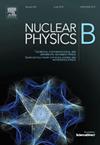Diffeomorphisms of the energy-momentum space: Perturbative QED
IF 2.5
3区 物理与天体物理
Q2 PHYSICS, PARTICLES & FIELDS
引用次数: 0
Abstract
A perturbative formulation of quantum electrodynamics is given in terms of geometrical invariants of the energy-momentum space, whose geometry is taken to be one of a constant curvature. The construction is relevant for different classes of noncommutativity: the Snyder model and the so called GUP models. For the Snyder model it is shown that all the amplitudes are finite at every order of the perturbation expansion.
能量-动量空间的衍变:惯性 QED
根据能量-动量空间的几何不变式给出了量子电动力学的微扰表述,其几何被认为是一个曲率恒定的空间。该结构适用于不同类别的非交换性:斯奈德模型和所谓的 GUP 模型。对于斯奈德模型,研究表明所有振幅在扰动扩展的每一阶都是有限的。
本文章由计算机程序翻译,如有差异,请以英文原文为准。
求助全文
约1分钟内获得全文
求助全文
来源期刊

Nuclear Physics B
物理-物理:粒子与场物理
CiteScore
5.50
自引率
7.10%
发文量
302
审稿时长
1 months
期刊介绍:
Nuclear Physics B focuses on the domain of high energy physics, quantum field theory, statistical systems, and mathematical physics, and includes four main sections: high energy physics - phenomenology, high energy physics - theory, high energy physics - experiment, and quantum field theory, statistical systems, and mathematical physics. The emphasis is on original research papers (Frontiers Articles or Full Length Articles), but Review Articles are also welcome.
 求助内容:
求助内容: 应助结果提醒方式:
应助结果提醒方式:


